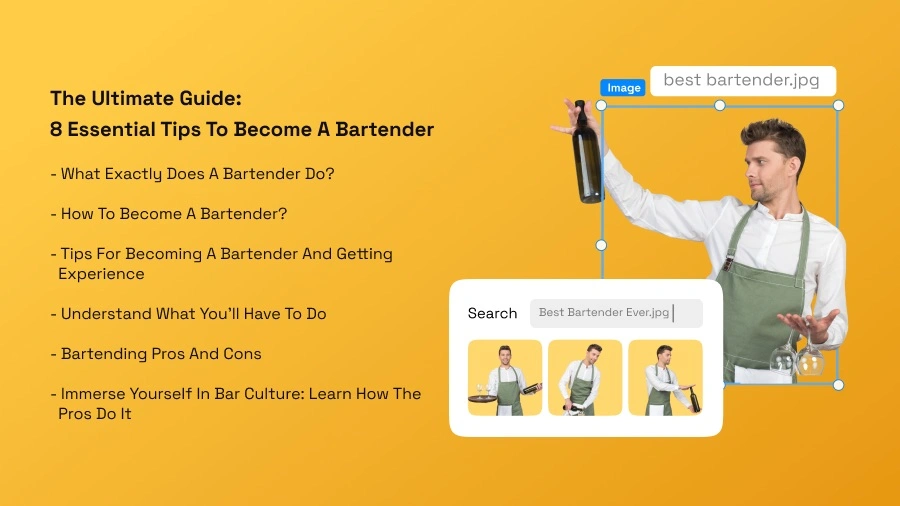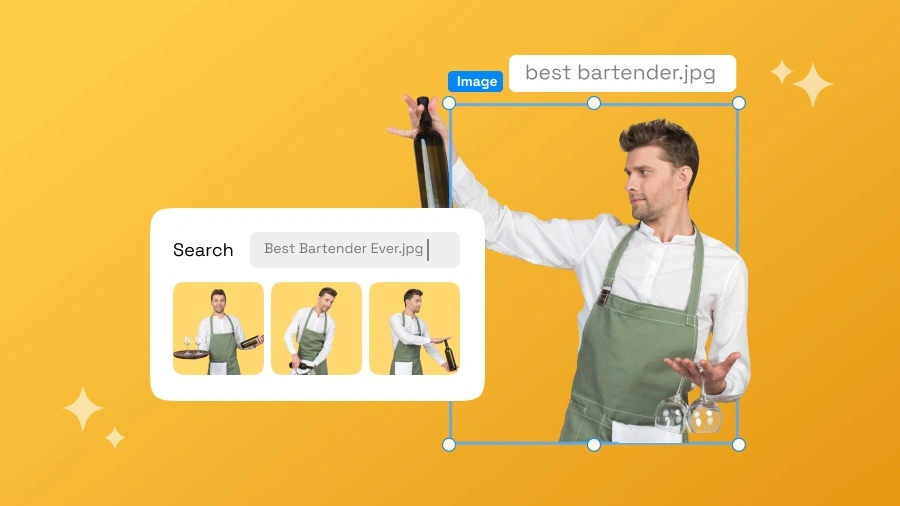The Ultimate Guide: 8 Essential Tips to Become a Bartender
Is becoming a bartender something, you'd like to do?
To outsiders, working as a bartender can appear fun and glamorous. But not everyone has the physical stamina, prioritization skills, or interpersonal skills to meet the demands of work at night.
A bartender is a professional who works in a restaurant, bar, hotel, club, or other establishment, mixing and serving drinks to customers. They may serve customers directly behind the bar or through wait staff. Many bartenders also help to keep product inventories and supplies in stock at the bar where they work.
Keep reading the blog further, here are eight tips to help you succeed as a bartender.

A bartender is a professional who works in a restaurant, bar, hotel, club, or other establishment, mixing and serving drinks to customers. They may serve customers directly behind the bar or through wait staff. Many bartenders also assist in the upkeep of product inventory and supplies for the bar where they work.
If you want to become a bartender, here are 8 tips to help you succeed. We've broken our tips down into three categories: bartending knowledge, work experience, and soft skills.
A bartender's daily duties include:
- Creating and serving alcoholic beverages and other beverages to customers
- Greeting and communicating with customers behind the bar
- Taking drink orders and preparing them based on recipes and customer preferences
- Making sure customers are of legal drinking age
- Customer payment collection
- Adherence to established rules and regulations for alcoholic beverages, other beverages, and food
How to Become a Bartender?
If you want to become a bartender, there are a few steps you can take. Take a look at the following:
1. Obtain a high school diploma
While a college degree is not required to become a bartender, you must have a high school diploma or GED. Additionally, you must be old enough to serve alcohol and tend bars in the state where you intend to work. Depending on the state, you need to be at least 16 to serve alcohol and at least 18 to work behind a bar in a place that has a license.
2. Attend bartending school
Attending bartender school isn't required, but it can teach you the fundamentals of mixing drinks and serving alcoholic beverages to customers wisely. Many hospitality schools offer bartending programs to people interested in this career path.
3. Work your way up and gain experience
A bartending school does not guarantee a job in the industry. You will still need to get on-the-job experience working in a bar or restaurant. Many bartenders begin their careers as waiters or runners before moving on to bartending roles.
4. Work as a barback
Being a barback is an excellent way to get into bartending, similar to starting as a waiter and working your way up. A barback, unlike a waiter, is more closely related to bartending. You'll learn all the tools of the trade alongside the pros, which could help you grow faster. You also don't need bartending expertise to work as a barback.
5. Put your skills to the test
It's vital to practice your skills after you're able to mix and serve drinks to consumers. Get as much practice as possible to improve your craft. You should also do some study to learn about new mixing techniques, bartending jargon, and taste profiles.
Tips for Becoming a Bartender and Getting Experience
We cover everything from understanding the bartending profession to developing your skills to getting your first job.
It is always a good idea, regardless of your chosen profession, to understand what your job entails.
For bartenders, this includes:
- Knowing what responsibilities you are expected to fulfill
- Identifying the pros and cons of the job
- Discover the culture of bartending
- Knowing your earning potential
- Begin with the fundamentals of Bartending.
1. Understand What You'll Have to Do
The first thing you should realize is that bartending isn't all glitz and glory. Second, the role usually includes the following responsibilities:
- Taking orders
- Pouring drinks
- Customer greeting and interaction
- Offering menus to customers
- Creating cocktails
- Verifying the age of customers by checking their IDs
- Cleaning the bar (and then cleaning it again!)
- Maintaining stock levels
- Accepting payments with your POS system
- Keeping track of intoxication levels
2. Bartending Pros and Cons
The role, like any other, has drawbacks.
To determine whether bartending is right for you, weigh the following pros and cons:
- Mentally, bartending can be demanding.
- Physically, bartending is difficult.
- You will be working in a high-pressure, demanding workplace.
- You'll be working late hours, and your weekends will not be yours.
- Work can be tedious and monotonous.
3. Immerse Yourself in Bar Culture: Learn How the Pros Do It
You've been to a lot of bars, but have you ever paid attention to how they work?
By visiting your favorite bar, you can learn about bartending without ever getting your hands dirty. Here's how.
Order a few cocktails. See how the barman makes them and works with the rest of the restaurant staff. Keep an eye on what they do between sips to keep things running smoothly. Take note of how the bartender interacts with customers as well.
4. Master the Barman Jargon
Knowing the language of the bartender will make your job easier. Do you understand these terms?
- Back: A small glass of anything served with a drink
- Chaser: A chaser is a drink consumed shortly after consuming a shooter.
- Dash: A small drop or amount of an ingredient (for example, a bloody mary with a dash of Tabasco).
- Dirty: Using olive juice in a martini.
Check out our blog post on essential features every pos for bars should have. And you should also be aware of new terms like angel shot.
5. Dive into Various Cocktails
Consider specializing in anything aside from understanding the lingo and learning how to prepare popular drinks and cocktails like martinis.
For example, you can concentrate your skills on one type of alcohol, such as whisky, and improve your cocktail knowledge and drink-making skills around it. This knowledge will help you:
- Make unique cocktails upon request.
- Make yourself stand out from the crowd of bartenders.
- Make more money.
6. Sharpen Your Skills
A successful bartender must have both a shot of hard skills and a shot of soft.
-> Building Your Hard Skills
Hard skills are those that can be taught, such as measuring and pouring drinks, making cocktails, processing orders, and keeping inventory. These skills can be learned at work or in school.
-> Sharpen Your Soft Skills
It is difficult to define, measure, and teach soft skills.
Here are three key soft skills you’ll need to be a good bartender:
Social skills: You'll spend a lot of time dealing with colleagues and customers; thus, this is arguably one of the most important skills. You'll also be working in a very social environment, so you'd better enjoy connecting with others.
Multitasking skills: You'll be serving several guests at once, which means you'll have to remember a lot of orders — all while engaging with workers, monitoring the bar, processing orders, and keeping customers happy.
Communication skills: To keep things moving smoothly during your shift, you'll need to talk clearly and freely (and perhaps loudly!) to your customers and colleagues.
7. Craft an Effective Bartender Resume
Writing a quality CV is key to landing a job, and it's simple if you follow the following tips:
- Keep it short (one to two pages). Managers frequently take a short scan to see if you're a good fit.
- Make sure there are no spelling errors.
- Highlight details that demonstrate your abilities to bartend. Include any serving experience or other experiences that will persuade the manager that you have the necessary soft skills.
- Check that all details are correct. Be honest.
- Include credentials and bartending classes.
- Make sure they can contact you! Don't forget to provide your email and phone number.
8. Get Hired as a Barback
Actual bartenders will tell you that if you want to learn how to be a bartender, you should start out as a barback. The barback position requires no experience, simply a desire to work hard. As a barback, you'll be required to do the majority of the manual work behind the bar, such as cleaning, refilling, and heavy lifting. The barback is essentially the bartender's assistant, which puts you in a wonderful position to learn and watch.
Working as a barback is not easy, but it has many rewards. If you've never worked in the bar or food service industries, you'll develop a knowledge of how things work on a daily basis. Pay attention to what's going on around you, and you'll pick up some helpful details:
- Make a point of learning the different brand names as you stock beer and spirits for the bar.
- Watch the bartender mix cocktails and take note of the most popular drinks.
- Get comfortable behind the bar and help with customer needs.
- Learn bartending jargon, like straight up and on the rocks.
- Learn when to stock up for busy periods and when not to.
- Learn about numerous types of barware and garnishes.
- Help your bartenders, and they may teach you how to bartend in return.
Conclusion
It is not easy to become a bartender. When you initially start out, you must be humble. Starting as a barback and learning from a mentor are two things you can do without prior experience. You'll see your dream come true faster if you're willing to learn and work hard.
Right away, dive into the world of bars with Restaurantify.
